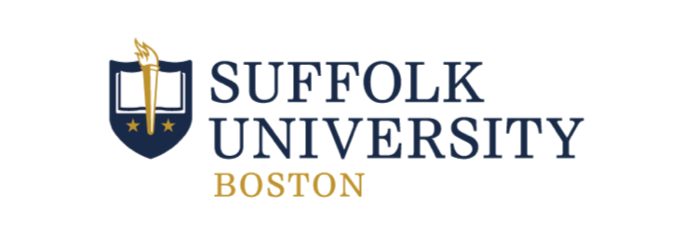Originally from Connecticut, Aubrie Souza began her career as an administrative assistant to an in-house counsel at an insurance company. In that role, she built workflows and systems to support attorneys, which exposed her to outdated legal processes. This experience opened her eyes to a larger issue in the legal field — the urgent need to integrate better technology.
Motivated by this insight, she decided to go to law school. But she wasn’t interested in a traditional curriculum; she wanted innovation. A recent Suffolk Law graduate introduced her to Professor Gabriel Teninbaum and the JD Concentration in Legal Innovation and Technology (LIT) at Suffolk University Law School. Intrigued, she researched the program and was drawn to its hands-on approach to modernizing legal services. The fit was clear — and she was all in.
“One of the best parts of the LIT concentration is that it’s both technology and innovation based,” Souza says. “I learned how to build cool tools and how to rethink processes to provide access for all, not just those who have access to technology.”

Aubrie Souza credits much of her post-graduation success to the LIT Lab at Suffolk Law. Source: Suffolk University
A national leader in legal tech education, Suffolk Law was the first in the US to launch a Legal Innovation and Technology concentration for JD students. National Jurist Magazine has ranked Suffolk’s LIT program #1 in the country multiple times, and Bloomberg Law has named the school one of the most innovative in the nation for two years running.
The early success of the LIT JD concentration and clinical leadership of the LIT Lab paved the way for the recent launch of Suffolk’s LIT Center to expand and increase its initiatives and leadership across both academia and industry, including with its new LLM in Legal Innovation and Technology. The graduate program offers full-time (one year) and part-time (up to three years) options, with in-person, hybrid, and online formats available.
The LLM was developed in response to a clear shift in the legal industry. Employers today — whether in law firms, government, corporate legal departments, or nonprofits — seek professionals who bring more than legal knowledge. They want problem-solvers who can manage legal projects, use data, automate routine work, and understand how to use AI and emerging tech effectively.
“This LLM is designed for professionals who want to deepen their understanding of legal tech and stand out in a competitive market,” says Professor Dyane O’Leary, who directs Suffolk’s LIT Center and serves as Academic Director of the new LLM. “It’s flexible, grounded in practice, and built to prepare graduates to lead — not just adapt to — change.”
The program’s curriculum is rich and varied, combining theory with practical know-how. Courses include topics such as the Twenty-First Century Legal Profession, Process Improvement and Legal Project Management, The Law of Artificial Intelligence, Design Thinking for Lawyers and Business Professionals, and Generative AI and the Delivery of Legal Services. These classes are about concepts just as much as they’re built around hands-on experiences, real-world assignments, and client-facing projects that reflect how the legal profession is evolving.
“For example, students explore how generative AI might support legal research or drafting while also learning where its limits lie and how to assess accuracy and bias,” Professor O’Leary says.

Suffolk Law’s LLM in Legal Innovation and Technology equips students with the skills to excel in today’s evolving legal landscape. Source: Suffolk University
Suffolk students have opportunities for experiential learning in the classroom through simulation-based courses and outside of the classroom through externships. For Souza, who was named one of National Jurist’s Law Students of the Year, her JD LIT Concentration externship meant spending a semester with the Legal Operations team at Micron Technology, Inc., a Fortune 150 semiconductor company. There, she worked on a project to standardize and automate the company’s contracting process — an experience that combined her skills in operations, law, and tech.
Other experiences open to LLM in LIT students include simulations, hackathons, and collaborative projects with industry professionals. Suffolk Law’s Legal Innovation & Technology Lab (LIT Lab) is a standout example, partnering with courts and legal organizations across the country to develop tools that improve access to justice. One of them is the Document Assembly Project, which creates guided interviews and mobile-friendly smart forms for people seeking help with issues like housing or family law.
The school’s broader LIT Center supports externship placements and hosts national legal tech events. It serves as a hub for legal innovation in Boston, offering training sessions for judges on topics like generative AI and supporting projects such as the law school’s new ODR Innovation Clinic in partnership with the American Arbitration Association.
“My success post-graduation is largely due to the LIT Lab and Suffolk,” Souza says. “I left law school with tangible, applicable skills that I immediately put to use at the National Center for State Courts. Importantly, I learned to think critically, communicate complex ideas, and approach challenges curiously. The training I received at Suffolk continues to shape how I work and innovate today.”
If you’re ready to lead the transformation of legal service delivery, the LLM in Legal Innovation and Technology is built for you. Applications for an August 2025 intake are now open, and the January 2026 application will open in early fall. A JD or international equivalent is required for admission.
Take the next step in shaping the future of legal practice. Apply now, or learn more here.
Follow Suffolk Law on Facebook, X, Instagram, LinkedIn, and YouTube.













